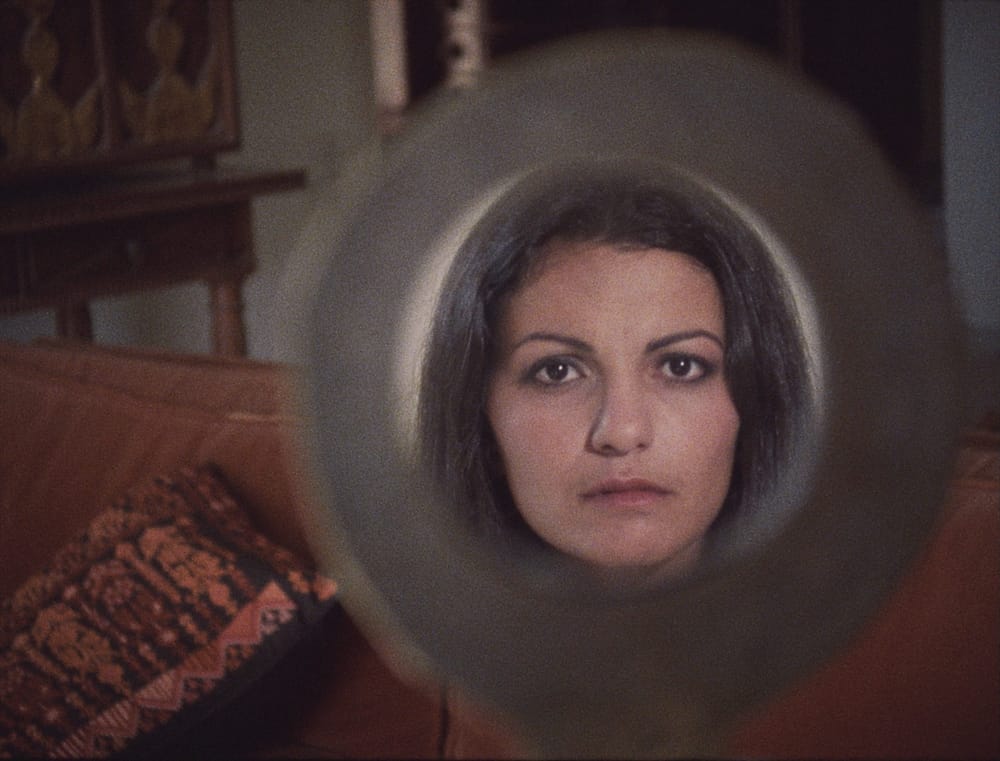The women sit sweltering on the beach with their burkas black and shrouding. Only metres away the men swim and laugh. Under the robes are dangerous objects: guns and bare legs that long to stand in the shallows and feel the water cool them.
Mixing documentary footage, live action, and creative reenactment Heiny Sror’s incredible 1984 film asks, “Where are the women?” in the conflicts surrounding Palestine and Lebanon: From the British taking of Jerusalem in 1917 from the German/Ottoman Empires through to the early 1980s where a ceasefire is happening for the fortieth or more time in whichever endless conflict is going on. Sror adds specificity with certain dates, areas, and the documentary footage, but also suggests the walk through of history Leila (Nabila Zeitouni) takes in her white robe is made up of the same death waltz.
Leila is a Lebanese curator in London creating an exhibition about Palestine and Lebanon. She hangs photographs of the conflicts alongside children’s drawings. The photos seem to only contain men and when Rafiq (Rafik Ali Ahmad), a man, steps into the space he notes, “Anyway, back then women had nothing to do with politics.”
The comment comes to him as casually as his instruction she wear something more traditionally feminine for the exhibition opening. A white dress. That night, Leila takes him through the history of Arab women and resistance to occupying forces. A Scheherazade-like figure, Leila tells the stories of women who fought not only invaders but the sexism inherent in Islamic culture.
Leila and the Wolves is a mosaic of tales that switch through time frames. Leila’s stories are provided by disembodied voices, historical records, poetry, song, and conversations. The same group of actors appear in multiple roles. A young girl cries because her father is removing her from school. Her sister doesn’t know what to say to her because marriage is their destiny. That same sister is later beaten by her husband for burning the food. Her grandmother tells her how to cook and please the man. Massage his feet. Be attentive. He will stay if he is fed, and his house is in order.
Women sneak past British guards with ammunition and rifles hidden in a wedding feast. Later, young women join the PLO only to be castigated for no longer fit for husbands. Rumours about their chastity circulate. Husbands divorce wives because they have become involved in collectives to defend their land. A mother of a baby is told to sell everything she owns to support the revolution despite the baby needing a doctor. She asks Allah to spare her child as she has given everything.
Heiny Sror’s master work Leila and the Wolves (Leila wa al ziap) is a piece of resistance and feminism where culture, identity, and gender are moving in a ouroboros-like cycle. Give, suffer, provide sons to be martyrs. Stay home, give more… marry the man chosen by another. Mourn. Wail. Be silent. Sror says no — it’s never that simple. How does a woman protect herself and the devastated land she loves if she is punished for doing so? The women were always there, they were always political, and their bodies joined in on the battlefields. Mother, sister, daughter, soldier: women of many wars.
Director: Heiny Srour
Cast: Rafik Ali Ahmad, Nabila Zeitouni
Music: Bachir Mounir, Laki Nassif
Cinematography: Curtis Clark, Charlet Recors
Editing: Eva Houdova
Leila and the Wolves screens at Cinema Reborn on Saturday 3 May 2025 at the Randwick Ritz in Sydney, and Saturday 10 May 2025 at Lido Cinemas in Melbourne. Tickets are available here.

